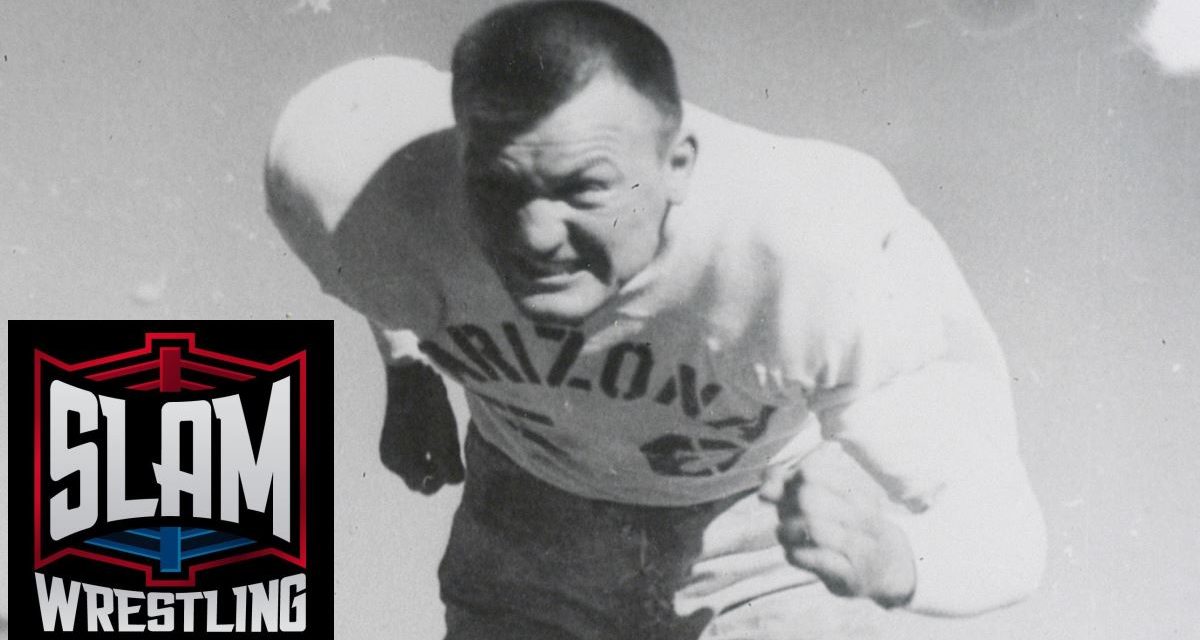Kelly Kiniski, the older son of former AWA and NWA Heavyweight champion Gene Kiniski, followed his father into the ring before setting into a quieter life in the Pacific Northwest. He talks to Steven Verrier about the Kiniski name, his own career in the wrestling business, his life after wrestling, and much more.
SLAM! Wrestling: Not many people reading this need an introduction to the name Kiniski. What was it like growing up a son of Canada’s Greatest Athlete?
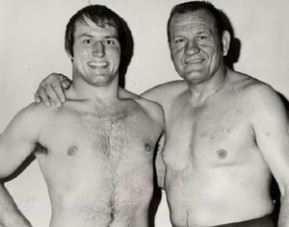
Kelly and Gene Kiniski, circa 1982.
KELLY KINISKI: Growing up as a Kiniski, that’s all I knew. That was my normal. A lot of people would say, “What’s it like? Your dad’s wrestling on TV.” That was my normal. I didn’t know anything else.
SLAM! Wrestling: Did you get challenged by other kids because you were Gene Kiniski’s son?
KELLY KINISKI: A lot of kids wanted to fight me in school, and I didn’t know why. But I was always big and I could just grab hold of the kid and put him down with not much effort.
SLAM! Wrestling: What were your thoughts when you saw your dad in the ring?
KELLY KINISKI: If he was ever getting beat up in the ring I hated the other guy that was beating up on him. … A lot of people would boo and holler at my dad, and that hurt my feelings when I was young. I knew very little about wrestling, and I just had my own little life.
SLAM! Wrestling: You were eight years old in early 1966 when your father cemented his place in history by winning the NWA world title from Lou Thesz in St. Louis. What did that mean to you at the time?
KELLY KINISKI: I wanted to take [the title belt] to school and do show and tell on it, but my dad said no, that wasn’t appropriate. I was happy that he was world champion.
SLAM! Wrestling: Your family lived in St. Louis during most of Gene Kiniski’s NWA title reign. Before that, your dad’s career had you living in a lot of places — including Buffalo, Minneapolis, Indianapolis, the East Coast, and, of course, the Pacific Northwest. You moved back to the West Coast when your dad was still going strong as NWA champion, didn’t you?
KELLY KINISKI: My parents didn’t want me travelling any more, thinking I was getting old enough that it was time for us to stay in one spot. The [Vancouver] airport was close for my dad to travel in and out and around the country and to Japan and places like that.
SLAM! Wrestling: I know you got into sports when your family settled permanently near Vancouver in Blaine [Washington]. What was it like when you first got into amateur wrestling?
KELLY KINISKI: My dad was Gene Kiniski. I was supposed to be great, no matter what.
SLAM! Wrestling: Did you encounter any of that old animosity between amateur and professional wrestling? Your dad was an amateur wrestling champion — in two countries, mind you; provincial and state — but did people sometimes tell you he wasn’t a real wrestler or even take their chances telling him that?
KELLY KINISKI: People didn’t really smart off to my dad much. My dad would pretty much put them in their place. My dad was a smart, fast talker. He was about 6’5, 275, and in shape.
SLAM! Wrestling: Unfortunately, a lot of wrestlers’ marriages, including your dad’s, fell apart for a lot of reasons. I understand your father really put you and your brother Nick first when he became a single parent.
KELLY KINISKI: My parents got a divorce when I was in 10th grade, and my mom moved out. My mom used to make all the beds and wash all the clothes and fold everything and feed us and do everything for us. When my mom left my dad didn’t really have any idea how to houseclean or wash dishes or fold clothes or how much bleach went in the washing machine. When I went to dry off, the towel in my arms would rip right in two because my dad put too much bleach in the wash. He said he didn’t want anything to change. He wanted it to be just like when my mom was there, so he actually made all the beds, did all the washing, made all the meals, grocery shopping — he wouldn’t let us help at all. He just tried to have it the exact same as when my mom was there, only he was doing it all. That was a huge undertaking for a guy who was always in a hotel room, had maids, and went out to eat all the time.
SLAM! Wrestling: You were big into football as well as wrestling when you were a teenager. Your dad played a few seasons of pro football. Did he work with you at all on the football field?
KELLY KINISKI: Some nights he’d have me hit him full-speed with me in pads and him with nothing on, and he’d just brush me off. And I thought, “How can he take me hitting him that hard?” … He spent time with me out on the football field. He was pretty tough out there. He wanted me to be great.
Then, as soon as football season was over, wrestling season would come about, and that’s when he used to bring pro wrestlers down, like Keith Franks, [who] was Adrian Adonis; Dennis Stamp; Khosrow Vaziri, [who] was the [Iron] Sheik. They used to wrestle me, and if I got too salty they’d drive me into the wall. I felt like the pro wrestlers were the toughest guys walking. They didn’t only have to work out for three hours with me on the mat. Then they had to go drive to wherever they were wrestling and go wrestle a professional match.
When I used to work out with the pro wrestlers in the summer, we’d do 600 Hindu squats, jump squats, and then we’d weight train. They weight trained me so much I’d be laying on the floor at the end of the day. I couldn’t push up to sit up. And we’d do neck exercises, and then I’d go running with my dad for three and a half miles around our neighbourhood. That was just normal.
SLAM! Wrestling: How did your dad react when you told him you wanted to be a professional wrestler?
KELLY KINISKI: [He insisted] Nick and I both had to graduate from university before we could start pro wrestling.
SLAM! Wrestling: So you went to West Texas State near Amarillo and played four seasons of football. How did you like it there?
KELLY KINISKI: When I went to university Tully Blanchard was my roommate. [Tully’s father] Joe Blanchard and my dad played pro football together. I thought that was pretty neat. Tully Blanchard always told me — because he was a senior and I was a freshman — he said, “No matter how late you get in or whatever you’re doing, make sure you get up and go to class no matter what.” He always made sure I was up even if he went back to sleep.
SLAM! Wrestling: Your father had already made a big impression in the Amarillo area, where’d he wrestled frequently since making his debut as a pro wrestler in 1952. How would you describe your welcome there?
KELLY KINISKI: When I got to Amarillo — home of the Funks, Ted DiBiase, and Dick Murdoch and John Ayers, who played for the 49ers — they made it just feel like home to me. The Funks, Terry and [his wife] Vicki, just treated me like one of their kids. [They] fed me all the time; took me on vacations with them. We did everything together. … Ted DiBiase and I got along well, and I’d go to the matches with him and we would talk. And Dick Murdoch was like a big brother. He would even fly me to the matches and fly me back, and I wasn’t even wrestling. I was just there having a good time with Dick, and Dick would pay for all my hotel rooms, the booze I drank, the food I’d eat.
SLAM! Wrestling: Did your father come down to visit when you were in college?
KELLY KINISKI: When I was in Amarillo, my dad would come and see me and wrestle in Amarillo or Lubbock. We’d go on the road together, and we’d have a good time in those days.
SLAM! Wrestling: Did you get back home to the Northwest much during those years?
KELLY KINISKI: I’d get to go home at Christmas, December breaks, and work out with my dad.
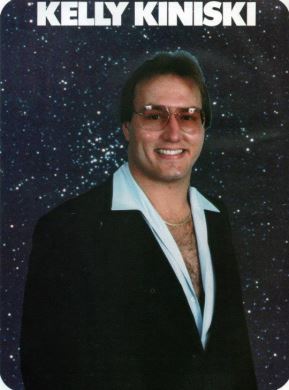
Proof that Kelly Kiniski wrestled in the 1980s is in this photo.
SLAM! Wrestling: I’m sure those workouts intensified after you graduated.
KELLY KINISKI: When I graduated from university [with] my Bachelor of Science degree in Mass Communications — Radio and TV, my dad flew down to Amarillo and helped me pack up. We went back home, and then we started working out. We started going to the [Pacific National Exhibition] Gardens in Vancouver … and we worked out in the ring. The first time when I jumped in the ring he said, “You’re a damned idiot!” I said, “What do you mean?” He said, “Look at how you’re getting into the ring. If the ring ropes break you’ll fall back and land right on the back of your head and it’ll knock you out cold.” So he showed me how to get in and out of the ring. And then he taught me how to tie it up, which I found difficult after years of amateur wrestling — to learn how to tie up professionally. And then he showed me how to hit the ropes, and my sides were so sore that I was black and blue and yellow on the sides because of those ring ropes being so hard. Then, when he started body slamming me and stuff, I actually urinated blood for three or four days or longer. It was really tough on me, [even though] I was in good shape from football and everything else I’d been through.
Having matches with my dad, he was all relaxed. I was nervous. My dad was not a real good teacher. He was a great wrestler but he didn’t know how to teach real well. A lot of times when he told me to do something, it was with the wrong arm or the wrong way. Having a match with him for an hour was like going through hell. And then finally I got done [training] with my dad. I didn’t know much at all, and my dad sent me to Calgary.
SLAM! Wrestling: Your dad was a co-owner of the Vancouver promotion with Sandor Kovacs and Don Owen, but you ended up wrestling there only a few times. Why did your dad send you to Calgary for your pro wrestling debut?
KELLY KINISKI: I guess he thought if I made it there I’d make it anywhere.
SLAM! Wrestling: How did you like working in Stampede Wrestling?
KELLY KINISKI: I was so used to the guys and the girls in the South and suntans and halter tops and everything else. To go to Calgary, Alberta, [where it’s 40] below zero … the guys weren’t real fun to be around. I lasted about six months there. It was just so much different than the wrestlers that were in the South that I used to be around.
SLAM! Wrestling: Everybody seems to have a Stu Hart story.
KELLY KINISKI: Stu always wanted to wrestle me and put a hold on me, and I told him, “If you want to put a hold on me, come get it.” He said, “You’re just like your old man.”
SLAM! Wrestling: Were there any wrestlers who were particularly helpful early in your career?
KELLY KINISKI: I was so green at the time. … I still had a lot of amateur wrestling in me. … Probably the one I got the most help from with pro wrestling was Tully Blanchard when I went to his territory [in San Antonio]. He sat me down and talked to me about ring psychology and how to have a match and different moves and different things. I had that bond with Tully already, and Tully was wrestling on top. I lived with Tully, so we were roommates. We had a lot of fun together, a lot of good times together. In that territory there was Southwest Airlines. You used to fly to most all your matches, so it wasn’t like you were just driving yourself to death like some territories. In a lot of territories I put on 4,000 miles a week just driving.
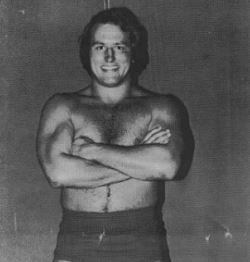
Kelly Kiniski in a World Class program.
SLAM! Wrestling: You did some wrestling overseas as well.
KELLY KINISKI: I liked Japan. I found the people really nice. I found the people that usually took me out after the matches — different groups of people — to be very polite and very nice to me. People would invite me into their homes and feed me and just show me a wonderful time.
I had a good time in Israel except I got hurt really bad there. The hospital, I guess, gave me a bunch of pain pills and no one was monitoring me. I don’t know how many of the pain pills I had, but I don’t remember flying back home or clearing customs or making it back to [the U.S.] or anything. … Buddy Roberts, one of the Freebirds — I remember he came into my room and kept on me … I sort of remember him in my fog. I was really hurt bad.
SLAM! Wrestling: You worked in some of the major promotions of the 1980s, including Jim Crockett’s Carolinas promotion and Verne Gagne’s AWA. How would you compare working for those two?
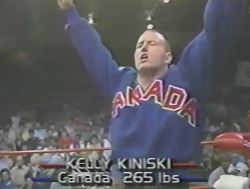
On television.
KELLY KINISKI: [In the Carolinas] we used to travel a lot. I had a good time with Jack and Jerry Brisco. … I remember Jack and Jerry trying to give [me] some good advice. … Every two weeks we’d fly up to Toronto and wrestle there. Angelo Mosca would always take good care of me, take me home, and feed me a good, home-cooked meal.
[In the AWA] you only wrestled like three or four times a week. That just felt to me like I was standing still when you’re used to wrestling 10 times a week and driving tons of miles. It just felt like I wasn’t doing anything. I didn’t really know what to do with myself with that much time off. … I just packed up and I left. And then I got a call from Verne Gagne. He said, “You made a mistake and you shouldn’t have left.” I said, “I didn’t make a mistake. I’m gone.” I wasn’t going to go anywhere there.
SLAM! Wrestling: You wrestled quite a bit in Texas and in Bill Watts’ Mid-South promotion. Other than renewing your friendship with Tully Blanchard and getting the chance to team at times with your brother Nick [who also wrestled professionally in the 1980s], what stands out when you look back?
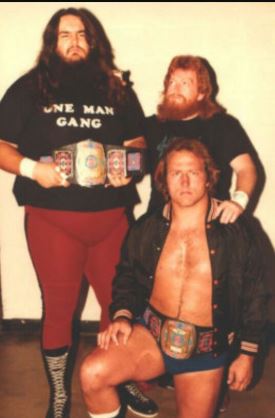
One Man Gang and Kelly Kiniski as Mid-Atlantic tag team champions under manager Sir Oliver Humperdink.
KELLY KINISKI: One night we were outside of Houston in Beaumont, Texas. Guys in the dressing room were bitching and complaining. In those days they used to dip snuff, so I took a big dip of snuff and I went into this other dressing room because I didn’t want to hear other people complain, and I heard some arguing going on and somebody didn’t want to wrestle Thesz or whatever. The only Thesz I could think of was Mr. Thesz, right? So I stuck my head out of the hallway and said, “What’s going on here?” And they said, “No one wants to wrestle Thesz.” And I said, “Are you talking about Mr. Thesz?” They go, “Yeah.” I said, “I’d love to wrestle him.” So I got to go out there in the ring and wrestle Lou Thesz.
SLAM! Wrestling: Of course, he was the legend your dad defeated to win the NWA World Heavyweight championship. How did your match with Mr. Thesz go?
KELLY KINISKI: He split both my lips open, both my eyebrows open, but it was just hard wrestling. It was no cheap shot — nothing like that. I couldn’t believe the speed and the agility and how many moves were named after him. It was like me playing against Bobby Orr or something. It was just like a dream come true. Here’s who my dad won the world title from, and Lou Thesz used to beat up on my dad when he was first in the business, so it was just an honour to be able to wrestle him. I didn’t realize how old he was until I went to the [George Tragos/Lou Thesz Professional Wrestling] Hall of Fame with my father and my brother [for Gene Kiniski’s induction in 2004]. I was watching a show about Lou Thesz, and it was black and white, and it said he was 40 years old [at the time]. When I was wrestling him I thought he was old — I figured he was like 50. But I think he was like 70. I can’t imagine what he was like when he was 21.
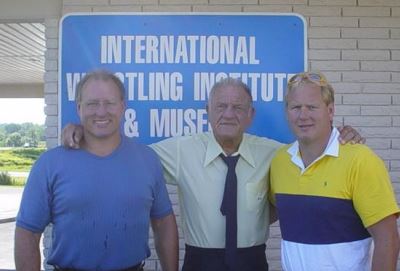
Kelly, Gene and Nick Kiniski attend Gene’s induction into the George Tragos/Lou Thesz Professional Wrestling Hall of Fame in 2004.
When Lou Thesz and I were in Tully Blanchard’s territory, a lot of times Lou Thesz would want to drive. I said, “Mr. Thesz, you’re not driving. I’ll drive you.” And we’d go on road trips together, so Lou Thesz and I would chit-chat a lot. That was the time period that I liked, and I liked the style and I liked the ruggedness of the guys. Just because you’ve got big arms and you’re all ballooned up and you can’t even walk around the ring — that wasn’t a wrestler to me.
SLAM! Wrestling: Other than Lou Thesz, what other wrestlers made a big impact on you?
KELLY KINISKI: Harley Race was wonderful with me. Ric Flair was great with me. We had a good time together. I think I fit more with the older guys. Ray Stevens I used to have a great time with. Dick Murdoch — we were just like Mutt and Jeff. You couldn’t separate us. I remember wrestling Dick. That was one of my hardest matches. I thought he was going to hit me with a right, and he hit me with a left. He hit me so hard, it took everything I had just to stay on my feet and not hit the mat. He said, “Kid, you thought I was going to give you a right, didn’t you?” I wrestled Murdoch that night, and we almost had a full riot on our hands. It was the first time, other than with my dad, being in a riot.
SLAM! Wrestling: The last phase of your career was in the Mid-South promotion, wasn’t it?
KELLY KINISKI: I got to wrestle on top a little bit there. I was really shocked that it really didn’t do much for me. Not much changed other than that you got a little more money and it’s a little bit easier wrestling on top than when you’re going out to be in a preliminary match. I was just disappointed. Then finally — Murdoch was with me that night, and I was his tag team partner, and I said, “Dick, this is nothing against you, but I’m done. I’ve had enough. I’m quitting.” He said, “Kid, you’re sensational. What are you going to do?” I said, “Give me your truck keys. I’m going to a movie, and I’ll pick you up after the matches.”
SLAM! Wrestling: What led to your decision?
KELLY KINISKI: The reason I quit was it says “wrestling” on the marquee and I didn’t feel that’s what the guys were doing in the ring any more. They started putting paint on the faces and slapping their bellies and marching around the ring. I was more like the Lou Thesz-era type of guy. You worked hard in the ring. You wrestled hard. And now all of a sudden these guys were having five- or 10-minute matches [and] mostly all interviews. To me, that’s not what I was here for.
SLAM! Wrestling: How was the process of transitioning out of wrestling?
KELLY KINISKI: When I got out of wrestling I didn’t believe that people worked only eight hours a day and had the evenings off and then had Friday night and Saturday and Sunday off and didn’t have to be back at work until eight o’clock the next morning. I was just used to go go go constantly, travelling, never home, never having any time for friends — just people that you knew on the road. Sometimes I would get to be friends with different doormen at different hotels because I’d be there every couple of weeks or so, and I would usually visit with a doorman or maybe a waitress.
SLAM! Wrestling: You worked in Texas for a few years post-wrestling before returning to the Northwest. Why did you come home, so to speak?
KELLY KINISKI: My brother was [back] here, my dad was here, and I just liked the Northwest. … I thought, if I’m not going to make huge money [in Texas] I’d rather live up in the Northwest, where you’ve got boating and fishing and hiking and ski-dooing and everything else. Plus it’s not 100-degree days and 40-below nights. So I decided I was more of a Northwest-type person. I really like trees. In Amarillo and those different areas, the people were fantastic with me. But it was just flat and no trees, and I really missed that.
SLAM! Wrestling: How have you kept yourself busy in the Northwest?
KELLY KINISKI: The way it ended up was that I got my own construction company down here in Point Roberts [Washington].
SLAM! Wrestling: I know your dad was involved in developing properties when you were a boy. Did that contribute in any way to your interest in construction?
KELLY KINISKI: My dad and his partner bought hotels and rental houses and they repaired them and fixed them up and a lot of times doubled or tripled their money. When I was a young kid, his partner used to hire me as a paint scraper or landscaper or whatever and then I would also get to frame a lot of his houses, so I got sort of a real bug. I actually really enjoyed being a framer and stuff, and I loved seeing a house go up. It excited me when the walls went up and the trusses went up on the roof. … I’ve sort of gone full circle of what I used to do as a kid that I enjoyed so much. I actually get to do it now, and I don’t have to get on a plane or go through security. I don’t have to do a long commute every day, which I’m really grateful for, because when I was in Dallas being an electrician I’d be five minutes away from home, but I’d have to sit and stop in traffic for an hour before the traffic would start moving again for me to get home.
SLAM! Wrestling: Back to where we started — with the Kiniski name. Looking back now, over seven years after your dad’s passing, how would you describe the lasting impact of the Kiniski name?
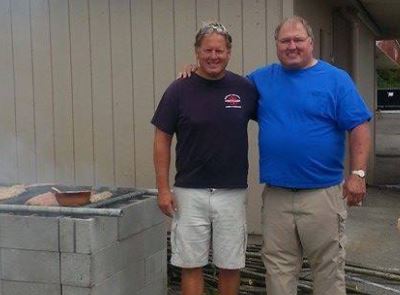
Nick and Kelly Kiniski in 2014.
KELLY KINISKI: What I enjoy the most is a lot of people still come up to me and they go, “Myself and my dad, we used to watch your dad wrestle, and we had such a great time. It meant so much to me” — or “your dad signing autographs” or “giving me a kiss on the cheek” — just different stories of how people have fond, fond memories. My dad, I’ve got to say, touched just a ton and ton of people.
My dad would have a big cigar … and in the airport people would come up with a kid, and they’d have to go to the next city — the kid would have to go but the parents weren’t going — and they’d pick my dad to be the person to watch after their kid, which I always thought was sort of funny because of how ugly and rough-looking my dad looked.
A lot of babies would crawl down their mothers’ laps. My dad would scream and holler at the little kid, and the little kid would laugh and crawl over on my dad’s lap. … And a lot of people wanted to feel my dad’s crewcut.
Even when my dad was eightyish, people would come in and say, “I’d like to meet you, Mr. Kiniski.” My dad goes, “I really appreciate you being a fan. I want to thank you, not have you thanking me.” My dad, right to the end, was always just promoting wrestling and being a gentleman.
SLAM! Wrestling: Can you leave us with one story that stands out?
KELLY KINISKI: So many people, women and guys, would be so happy to meet my dad. They never thought they’d get to meet him and have some stories or parties or whatever. One woman, when I was selling real estate, came into my office. She said, “I have a story for you.” And I thought, “What’s this going to be?” And she said, “When I was real young I was hitchhiking, and your dad pulled over in a big blue Cadillac. He put me in the car and he started screaming and hollering at me.” She said, “I didn’t even know what was wrong.”
My dad said, “Don’t you ever hitchhike again! Where do you live?” And my dad took her right to her front door, and he says, “You’ve got to promise me never to hitchhike ever, ever again.” When she was in my office she was like 40 or 50 at the time, and she said, “You know what? I never hitchhiked ever again.”
RELATED LINK
